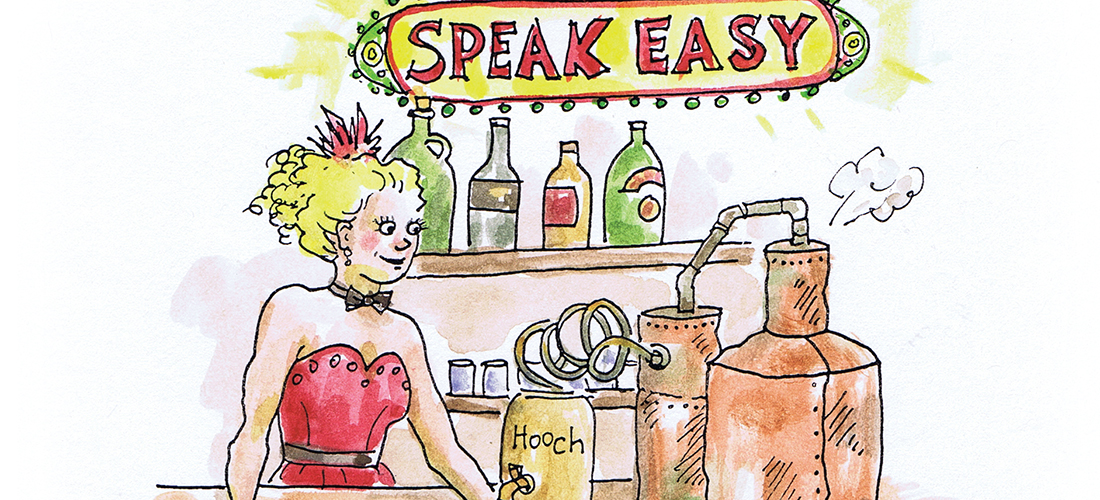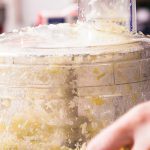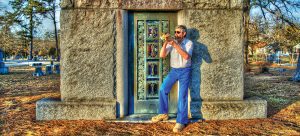
The Shining
The spirited life of a holler-back girl
By Jane Borden
When I left New York, I’d intended to return to North Carolina. But love and marriage got in the way, and I followed my new husband to Tennessee, which is at least North Carolina adjacent. He took a teaching job at Sewanee: The University of the South, located in the woods of Monteagle Mountain.
Very quickly I decided to make moonshine and open a speakeasy. As one does. Like hundreds of shiners before me, I was living in the woods of Tennessee and in need of money, which led me to discern the obvious choice. I would be like Al Capone, who, legend has it, kept a home in Monteagle — the midpoint between Miami and Chicago — during Prohibition so he could stop for a rest and pick up more hooch along the way. I would be like Hamper McBee, the area’s most famous modern moonshiner and balladeer, who plied his trade at hidden homemade stills during the ’70s, singing of drunkenness while he stirred the mash. I would be like Jasper, the large bearded man I’d befriended at a local farmers’ market, who’s fond of camo overalls and agreed to teach me to make wine from peaches.
My bar would be classy, with a soundtrack mix of blues and indie rock, and a menu of classic cocktails with modern twists. I investigated demand, which was high since we lived in a semi-dry county, and costs, which were also high as I would largely be reselling store-bought liquor, making my endeavor doubly illegal. Then I drew up a business plan, and was exploring potential locations, when two fiery signs appeared. One, Jasper’s house burned to the ground. Two, the restaurant Pearl’s, which had also burned to the ground three years prior, announced its reopening — and that it would have a liquor license, the only one in town.
Fires in the area are common, thanks to rugged DIY architecture, insurance fraud, renegade justice for mountain grudges, and the hundreds of meth labs that have earned Grundy County the status of meth capital of the world. I decided, therefore, that my speakeasy was a phoenix, which perished with Jasper and was reborn inside Pearl’s. And I humbly pointed myself to a lawful path. I stopped by the construction site, with a mocked-up cocktail menu in hand, and got myself hired tending bar at Pearl’s, on Highway 41 on the Cumberland Plateau of South Central Tennessee.
As the classic-cocktail revival took hold in the early aughts, I was first in line at Manhattan speakeasies, laughing at their pretentious lists of conduct rules, but giving them all of my money nonetheless. Housemade bitters, shrubs and purées; strangely scented liqueurs from far-flung countries; and top-shelf booze packaged in work-of-art bottles: I was intoxicated.
But only as a consumer. There’s no reason to invest in stocking a
New York home bar when a mustachioed mixologist is on every corner doing it better than you, and looking smarter in suspenders. But in a small Southern town, if you want something not indigenous to the area — like bagels or racial diversity — you must manufacture it yourself. Within a month of living in Sewanee, thanks to a couple of liquor-store trips to Nashville, I transformed our small wooden stand-alone bar into an amateur mixologist’s dream. My appreciation became a hobby, which is largely why we kept throwing parties. Nathan and I couldn’t consume it all ourselves.
And so I began to want my own speakeasy. I knew, however, that simply making drinks — no matter how crafted or unique — would never be enough of a draw, since anyone can google recipes and make his or her own trip to Nashville. But then Jasper mentioned peach wine. Even if no one actually ordered much of it, curiosity about an epicurean moonshine wine might pull them in, like those dancing balloon men outside of car lots that fill with air and then deflate, over and over — except classy. Plus, the process was much less intimidating than building a still and acquiring 50-pound bags of rye. From what I recall, it required lots of pots, several buckets and maybe a bathtub? Jasper detailed the recipe and process for me one morning at the Saturday farmers’ market. It sounded pretty simple. We decided to find a time for me to come to his house and apprentice him. He gave me his number. Then his house burned down.
Like the Appalachians to its east, the Cumberland Plateau has been moonshine country for as long as it’s been inhabited. The craggy and unpredictable conglomerate-rock geology of the plateau and its coves makes the land largely impassable and fundamentally unfit for development. The area is a treasure of virgin forest for this reason, and not because of environmental stewardship or a benefactor’s largesse. The University was only founded there, before the Civil War, because a logging company determined it couldn’t move equipment through the land, and dumped the acres on the Episcopal Church for a tax break.
In short, there are ample nooks for hiding stills. Shakerag Hollow, a cove at the edge of Sewanee’s property, was named for this tradition. When you wanted a bottle of hooch during Prohibition, so the story goes, you stood at the edge of the bluff, shook a rag in the air, left your money on a rock and returned the next day to collect the bottle sitting in its place. I like to imagine the rag was white, as if customers were surrendering to the booze. “I give up, whiskey: You’re too delicious.”
Today, state-park–designated trails frequently pass remnants of stills from the moonshining heyday, the whereabouts of which, at the time, were violently guarded secrets. The practice remained, even long after Prohibition. A friend of ours, Jean, is fond of riding her horse through the cove abutting her property. She recalls coming upon an active still once, decades ago, and meeting the business end of a rifle, which convinced her to turn back and forget where she’d been.
Today, the trade still flourishes. Nathan and I once saw a makeshift marketplace open for business in a shady corner of Party Cove. Also known as the Redneck Riviera, Party Cove has cropped up in more than a couple of popular country songs. It is a section of Percy Priest Lake — a Tennessee Valley Authority lake, a flooded hollow created by a WPA project during the Depression — in which groups of motorboats anchor and tie buoys to one another, for the purpose of swimming and multi-watercraft partying. Nathan and I were lucky enough to visit Party Cove on occasion, where we turned our life jackets upside down and sat in them like diapers in the water; where sound systems compete and whichever song makes bikini-clad girls dance becomes the winner; and where bottles of Fireball Cinnamon Whisky float along beside you in the water and/or are poured directly into your mouth.
One afternoon at Party Cove, we began to notice that people were swimming, one at a time, to and from a corner dense with brush. A pair of binoculars revealed that each swimmer held one hand above the water, clutching cash on the way over, and a mason jar on the way back. And I’d thought New York was lawless.
The romance wooed me: homemade whiskey, the black market, the taste of apple-pie moonshine, diluted and sweet enough to sip straight from the jar, which I did in the passenger seat, all the way home from Percy Priest that day.
My speakeasy endeavor wasn’t just about money and craft cocktails. It would be a connection to the land, a well that was dug directly into a sense of place, a way for me to finally feel at home in this new and foreign land. Moonshining is so deeply ingrained in the community that getting caught probably wouldn’t even get my husband fired. Plus, if I was making drinks all night, I’d be less likely to consume them.
But, as previously detailed, the dream deflated like a dancing man made of air who’s lost his hose. And then the phoenix: Pearl’s. The mountain filled with talk of its fine-dining aspirations and its new head-chef and co-owner, who hailed from the culinary scene in Northern California. She knew the mixology movement. She liked the menu of drinks I brought to my interview. I convinced her I could expand the market for them. She hired me. So began my days of tending bar on the plateau, where change comes as slowly as the erosion of the surrounding mountains that created the plateau to begin with — which is to say that most of the customers ordered beer. OH
You can find Greensboro native Jane Borden, author of I Totally Meant To Do That, in L.A. now — or at JaneBorden.com or via twitter.com/JaneBorden.





